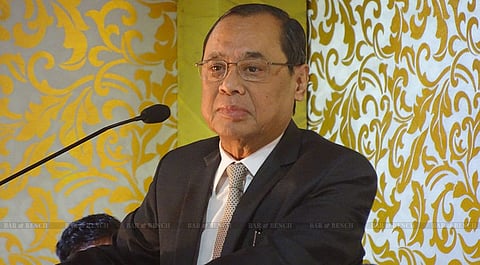
- Latest Legal News
- News
- Dealstreet
- Viewpoint
- Columns
- Interviews
- Law School
- Legal Jobs
- हिंदी
- ಕನ್ನಡ

Amidst the ongoing tussle between the executive and the Supreme Court, former Chief Justice of India (CJI) Ranjan Gogoi on Friday called for statesmanship from both sides.
The Rajya Sabha Member of Parliament (MP) and ex-CJI was speaking at the Surat Literature Festival, when he touched upon the 'storm blowing over the Collegium system'.
He said that if the government feels changes are needed to Collegium system, the same should be discussed elsewhere instead of taking potshots at the judiciary on public platforms.
"It calls for astute, leadership and statesmanship from both sides. It is not a question of who is superior or who should have the last say in the matter of appointment of judges. If the appointments need changes as the political executive feels then an appropriate place to discuss is elsewhere and not public platforms where you take potshots at the judiciary. If judges feel there is a point then judicial seat is not the place to address it from."
Justice Gogoi emphasised that the situation calls for huge responsibility from both sides.
Over the last 12-odd months, Union Law Minister Kiren Rijiju has not held back at expressing his reservations with the existing system of appointing judges through the Supreme Court Collegium.
Among other things, Rijiju had said that until the procedure for appointment of judges is changed, questions regarding pendency of cases in Indian courts will continue to be raised.
He had recently to written to CJI DY Chandrachud suggesting that government representatives be included in the Supreme Court and High Court Collegiums.
The Law Minister also found a vocal ally in Vice-President Jagdeep Dhankhar, himself a Senior Advocate, who has also been critical of the Collegium.
The Collegium also hit back with a series of resolutions publish on the Supreme Court website on Thursday highlighting in detail why the Law Ministry was blocking the candidature of many lawyers for judgeship.
Justice Gogoi in his address today said that pendency of cases is a matter of concern requiring special attention of all the stakeholders.
In this regard, he also highlighted how the government was not helping since it continued to be the biggest litigant.
"The total number of cases by the govt, there is a huge room for improvement. Why would a party come to court unless he is aggrieved," he asked.
He also said one reason why government files appeals in every matter is because nobody wants to take responsibility and be held accountable later.
"The problem with our country is no one wants to take decisions or responsibilities. For the smallest of things attitude is if we are take to decision we are to be penalized. Parliamentary committees or superiors will ask hundreds of questions. So (they think) best is not to do it and go to courts , let court decide and we will implement," he said.
The former CJI also lamented the lack of discussion on repealing laws or re-examining legacy ones.
"The parliament is repealing some obsolete laws. I am not on that. But I am on day-to-day administration of justice. I am talking about CPC [Civil Procedure Code] and CrPC [Criminal Procedure Code]. Every decree has a three-tier journey. Can we not engraft some of the principles of execution of decrees while hearing the suit. This will call for examination of CPC. Have we thought about it? No. Have we started it ? No."
He posed the question as to why why criminal appeals take the time they do, rendering some matters infructuous, particularly in the bigger High Courts.
"Murder trials etc take 3 years but it gets stuck in appellate stage. How many appeals in bigger High Courts like Allahabad etc have become infructuous because accused is no more ? Has an excercise been done ? No."
The former CJI also stressed on the qualities required by judges to deliver justice, pointing out that today too many judges are resorting to work in a 9-5 style as they think working hard is futile.
"Are we looking for people for whom judgeship is not a 9-to-5 job but about passion and commitment? Have the right person at the right place and you do not have to worry about judge to population ratio. Get people with commitment and people who have commitment, identify them and protect them. I know many young people who became judges but regretted it because system could not protect them."
The Rajya Sabha MP also said that contentious issues like the Uniform Civil Code are better left for discussion in parliament than forums like the present one.
[Follow our coverage of the speech]